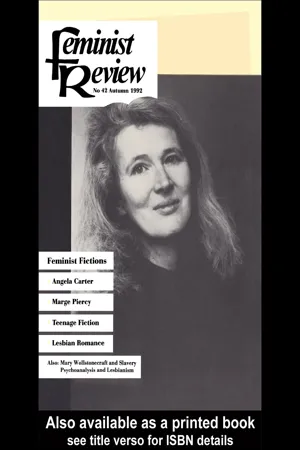Feminist Literature
Feminist literature refers to literary works that explore and advocate for the rights, experiences, and perspectives of women. It often challenges traditional gender roles, stereotypes, and power dynamics, and addresses issues such as sexism, discrimination, and inequality. Through storytelling, poetry, and essays, feminist literature aims to raise awareness, promote gender equality, and empower women.
3 Key excerpts on "Feminist Literature"
- Maggie Humm(Author)
- 2015(Publication Date)
- Routledge(Publisher)
...The challenge then to feminist criticism was to investigate and to re-figure gender differences, and to describe potentially new relationships between gender, language and literature. A major problem for feminist criticism in the 1970s, indeed for feminist criticism today, is that feminist work lacks institutional power. The feminist critique of language needed to be linked to a critique of the construction and dissemination of knowledge in the academy. For feminist criticism to have a space, academic respect must be granted to its views. The feminist project of literary discovery was intimately linked therefore to a feminist pedagogical project – to the teaching and the interpretation of literature. It is not surprising that new pedagogical strategies were simultaneously pursued by leading feminist critics. Early examples include Elaine Showalter’s essay ‘Women and the Literary Curriculum’ which appeared in College English in 1970; essays on women writers by Showalter, Rapone and Snitow which appeared, not in literary journals, but in the first anthology of the American women’s movement – Radical Feminism (1973); and Adrienne Rich’s ‘Writing as Re-vision’ which also appeared in College English (1972). Elaine Showalter’s A Literature of Their Own (1977) was an important contribution to this agenda. Reflecting on Woolf’s A Room of One’s Own, Showalter faced the similar issue of women’s exclusion from the academy. Charting a long history of literary women, she brought attention to undervalued nineteenth-century writers such as Sarah Grand and George Egerton. Rather than defining a ‘universal’ woman’s text, Showalter preferred to identify a female ‘subculture’ which created those texts. She replaced the traditional periods of literary history with an alternative three-stage process which she couched as a growth into consciousness – feminine, feminist and female...
- eBook - ePub
Using Critical Theory
How to Read and Write About Literature
- Lois Tyson(Author)
- 2020(Publication Date)
- Routledge(Publisher)
...Chapter 6 Using concepts from feminist theory to understand literature Why should we learn about feminist theory? As we saw in Chapter 4, psychoanalytic theory asks us to examine the ways in which our personal identity is formed by our early emotional experience within the family. In Chapter 5 we saw that Marxist theory asks us to examine the ways in which our personal identity is formed by the socioeconomic system in which we live. Feminist theory asks us to examine, instead, the ways in which our personal identity is formed by our culture’s definitions of what it means to be a man or a woman. For from a feminist perspective, our experience of ourselves, our family, and the socioeconomic system in which we live depends to a large extent on our sex: on the ways in which men and women are treated differently and on the ways in which men are socialized to be masculine and women are socialized to be feminine. Specifically, in most cultures, men occupy most or all positions of power, which is why those cultures are called patriarchies or patriarchal cultures. For the word patriarchy, broadly defined, refers to any society in which men hold most or all of the power. In a patriarchy, women suffer varying degrees of oppression depending on such circumstances as their race, ethnicity, socioeconomic class, religion, gender identification (our internal sense of our own gender, which may or may not match our apparent biological sex at birth), sexual orientation, disability, age, and the country or region in which they live. Feminism, therefore, seeks to understand the variety of ways in which women are oppressed—socially, economically, politically, and psychologically—in order to reduce, if not eliminate, their oppression...
- eBook - ePub
Feminist Review
Issue 42: Feminist Fictions
- The Feminist Review Collective(Author)
- 2005(Publication Date)
- Routledge(Publisher)
...From this perspective part of the necessary knowledge about women and their place in society, as well as about human society as a whole, could be gained from Feminist Literature. One will read that the themes which the new Feminist Literature deals with can also not simply be understood and dismissed as women’s themes. And yet today it requires women to take up these themes of life and death, of AIDs and politics, of war and fascism, of common crimes just as much as the uncommon ones, in an adequate way, that is, in terms of their real magnitude and significance for humanity. Notes See, for instance Haug, 1987 and Haug, 1992. References Haug, Frigga (1992) Beyond Female Masochism: Memory-Work and Politics London: Verso. Haug, Frigga and others (1987) Female Sexualization London: Verso. Haug, Frigga and Hauser, Kornelia (1988) ‘Zeit für mich—über das Privatisieren, in Haug and Hauser edition, Subjekt Frau Berlin: Argument. McIntosh, Sheila (1991) ‘Feminist mystery writer Barbara Wilson. An interview’ Sojourner: The Women’s Forum May. Piercy, Marge (1983) Braided Lives London: Pan. Piercy, Marge (1986) Fly Away Home Harmondsworth: Penguin. Schulman, Sarah (1990) ‘Helen Birch talks to Sarah Schulman’ City Limits March....


